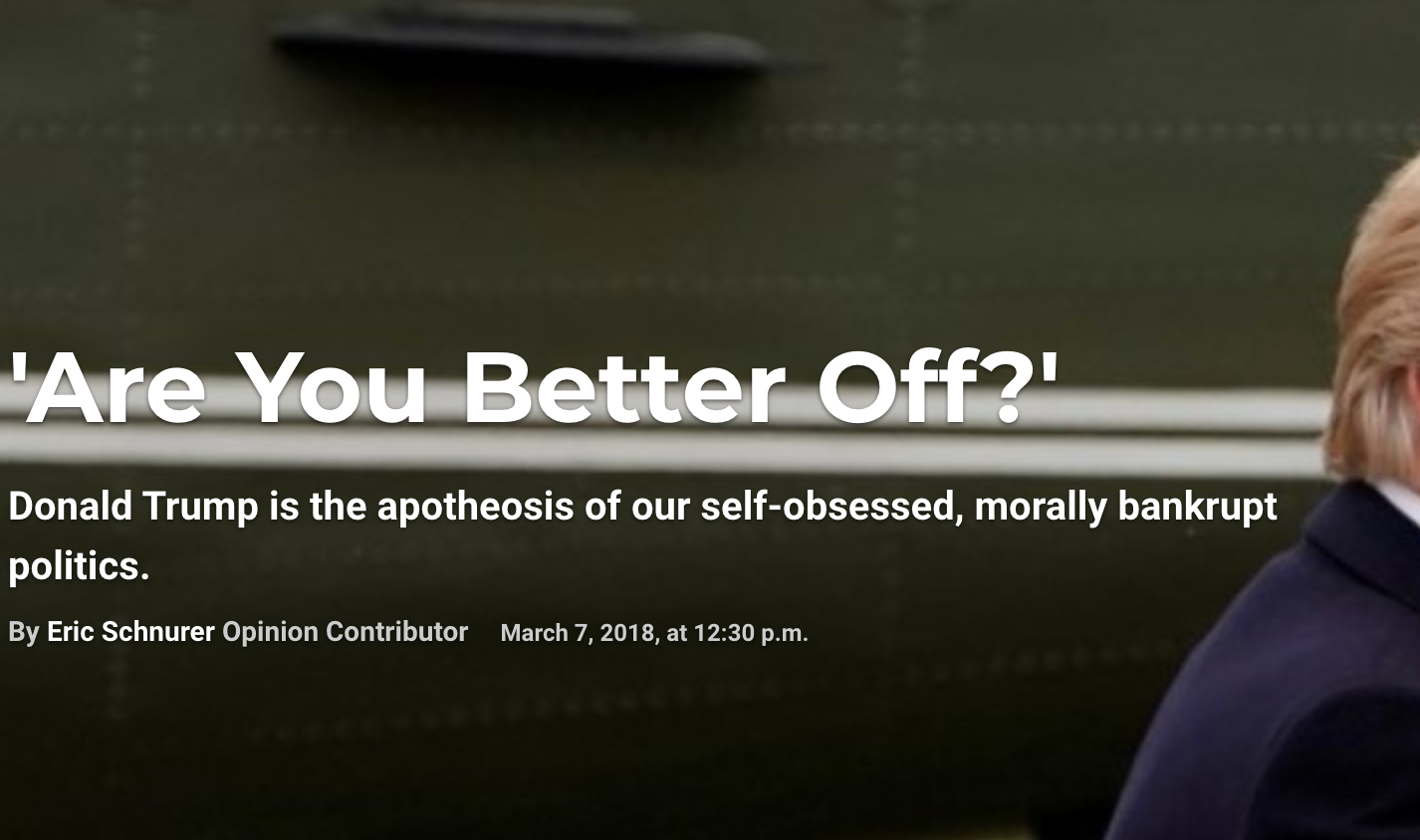Parkland shooting
“Are You Better Off?”
 I just wanted to share with you my most recent piece for US News & World Report, which is also, sadly, my last, as they’ve discontinued their Opinion section. Watch for news on my new writing outlets soon.
I just wanted to share with you my most recent piece for US News & World Report, which is also, sadly, my last, as they’ve discontinued their Opinion section. Watch for news on my new writing outlets soon.
PRESIDENT DONALD TRUMP last week launched an international trade war, hung up on Mexico’s president because he wouldn’t agree to pay for Trump’s border wall and announced he favored seizing guns without due process (a position from which he quickly retreated). These issues all have something in common (other than Trump) that goes to the root of what’s wrong in American politics today.
As discussed (here and here) during the 2016 campaign, both trade and immigration constitute a particular type of problem: Each benefits the larger society, raising the standard of living not just of the country as a whole but also of the majority within it. Yet both produce losers; various studies show, for instance, that immigration results in higher earnings for those with already-higher earnings – but lower wages for the lower-skilled.
Such “wedge issues” are used by politicians to drive Americans apart to the advantage of no one but these politicians. They are a means to exploit people’s misfortune by turning it into anger – and then turning that anger into votes. What they are not are exercises in building constructive solutions to problems, through compromise, consensus or common cause. And they are all traceable to the single watershed moment in which Ronald Reagan transformed American politics into the unrelenting exercise in selfishness that it is still today, when he asked Americans to vote on the basis of one question alone: Are you – not the country as a whole, or others, but you – better off today than you were four years ago?

Yes, politics is largely about self-interest, and even the Framers believed that a balance of self-interests, not messianic utopianism, was the central requirement of stable democracy. But the country’s leaders used to call us to a vision – even when the ultimate goal was individual freedom and self-realization – of an America greater than each of us individually. “Ask not what your country can do for you, ask what you can do for your country” died with “Are you better off?”
Trump is the apotheosis of this morally-denuded politics. Has there ever been a human being so clearly interested in nothing but himself? Despite his faux populism, his agenda in office has been a mix of standard-issue tax breaks targeted almost entirely to his fellow plutocrats and banana-republic self-enrichment. Even his conception of “making America great again” is about atomized self-interests, not any notion of an “America” embracing all, or even most, of us, knit together to form a society: A “greater good” beyond individual grievance? Global leadership? Moral values? As Robert D. Kaplan recent wrote in The National Interest (by no means a liberal publication), “[Trump] has also, with his calls for protectionism and a narrowly defined American self-interest, voided American foreign policy of any real, uplifting purpose – another sure sign of decline.” We are, in short, a country losing its way morally, one wallowing wholly in self-interest.
Whatever Trumpism’s underlying themes of racial, sexual and economic resentments, Trump has chosen trade, immigration and the demise of extractive industries as his chisels to break apart American society precisely because, while these have generated tremendous gains for the U.S. as a whole, they produce a subset who pay the price for the overall advance. Morality – as well as a practical regard for political reality and social peace – suggests that some of the gains of progress be redistributed to its victims; this might, in fact, be regarded as the core of “progressivism.” But as Democrats have become the “Party of the Ascendant,” those left behind by the world economy – largely older, white, religious, conservative males with lower levels of education living in rural or exurban areas – don’t seem all that appealing, or deserving of solicitousness, to “progressives” nowadays. In lieu of adequate solutions, Trumpism has been left to exploit the resulting unfairness and resentment to tear down both broader progress and all social cohesion.
This is exemplified in the current polarization over guns, as well, a point brought home by a Douglas High School student, Emma Gonzalez. Toward the end of her fiery speech with its refrain, “We call B.S.,” Gonzalez observed that the position of gun advocates appears to be that their rights to own guns outweigh children’s right to live. This has been a recurrent liberal argument since the Parkland shootings – but liberals ought to be wary of assertions that all rights must be balanced against other concerns: The rights to a fair trial, or against cruel and unusual punishment, or to free speech simply are not outweighed by governmental exigency or others’ sensitivities. Nonetheless, as I wrote after these shootings, most of us recognize and voluntarily concede non-governmental restraints on our rights in order to live in, and help produce, a functioning society with others. It’s called decency.
What’s striking about the gun debate today is the absolute unwillingness to seek the kinds of compromise necessary to a society, as opposed to an unwilling collection of individuals. We are no longer interested in anyone else’s perspective or anyone else’s rights. As Gonzalez summed up the situation, dismissively, “Mine! Mine! Mine! Mine!”
This phenomenon isn’t helped by Trump’s suddenly announcing that, as on so many other issues, the answer is to empower his own id and worry about constitutional rights later, if at all. We actually don’t need a Great Leader who believes that He Alone can solve our problems as a society – although that is an appealing solution to a growing, and scary, number of Americans. Rather, we need a society willing to solve its problems as a society.
It’s increasingly clear that we no longer live in such a world. We increasingly live, rather, in neighborhoods where no one disagrees, read news that doesn’t challenge our views, select our own definition of truth like we do our own music, and never have to adjust our preferences to those of anyone else. Neither politics, governments nor countries as we know them will last in such an environment. The question is whether such concepts as common good, or compromise, will.
You Can Do Anything

The other night, just after finishing my piece that ran yesterday on what we can do about gun violence, I received an email from a student at Princeton University, where I’d given a talk two weeks ago. It began;
“Thanks so much for coming to Princeton, firstly! The discussion with you is one of the best events I’ve ever been to at Princeton – you felt really accessible, personable, and I, at least, felt like I could do anything afterwards.”
That’s probably the first time anyone found me particularly “accessible” or “personable.” But what I talked about at Princeton was the work I’m doing outside my consulting to respond to the changes I see in the world today through the “Greater Good” initiative I’ve discussed here a bit, and my related efforts to launch a “government business.” Unlike most people I know, who think we’ve descended into a second Dark Age, I believe we’re entering a Golden Age for the ability of us all individually to – in Gandhi’s phrase – be the change you want to see in the world. That’s why this student – and the others who hung around afterwards to talk with me about career pursuits – rightly took from my remarks the feeling that he “could do anything.”
My piece yesterday in US News (which was also picked up by MSNBC) in reaction to the Parkland shooting discusses the same phenomenon behind my optimism about our ability to act – if at the same time, indeed because of, my declining belief in traditional politics as the best route for doing so. In People, Not Politicians, Can Solve America’s Gun Problem, I note that, “not surprisingly, mere days after the massacre at their school, students from Parkland watched from the gallery as their state legislature voted down holding any debate whatsoever on assault weapons this year. There almost certainly will be no meaningful government action against gun violence.”
I’ve used my US News platform to argue for several years now that “governments everywhere are growing in impotence due to a host of tectonic global shifts,” and, to me, what’s happening now over guns proves the point: A minority of Americans representing a return to extractive economics and politics now holds virtually unchallenged political power in the US – and increasingly around the world – yet the majority, who live in a very different world economically and ideologically, are rising up to wrest power from them on this issue, led by the least powerful of all: children. My argument is that this effort will continue to fail politically – but that is irrelevant. It will succeed through non-governmental means – and I give numerous examples: consumer boycotts, disinvestment campaigns, voluntary home interventions, public shaming, moral opprobrium, information and education, even (God forbid!) research. “A previous generation of young Americans ended a war and ushered in an era of greater tolerance by changing society more than by changing politicians. That’s where attention needs to be focused.”
This ties into the Greater Good, the “government business,” and a new series I’m writing for a national publication on what “progressivism” or “liberalism” need to mean in the 21st Century. New technologies are making it increasingly difficult for centralized authorities to assert and maintain their dominance – reducing marginal costs, lowering barriers to entry, making it easier for individuals to act on their own, and virtualizing virtually everything. These same technologies also make it quicker and easier to aggregate individuals, metricize and monetize virtually everything, keep free-riders out and enforce commitments amongst those who opt in. This isn’t eliminating all “authority,” but it is disaggregating, distributing, and disrupting what authorities already exist. This will prove just as true in governance as in every other industry.
This poses tremendous challenges to social cohesion, collective action and public goods through the mechanisms that have governed our world for centuries. But those mechanisms haven’t always existed as they are today, and they won’t exist that way in the future. Meanwhile, these changes present tremendous new opportunities for social cohesion, collective action and public goods through new mechanisms – like the student-launched social ventures I talked about recently here, like the non-political social movement we’re building with the Greater Good initiative, and even the business I’m launching to allow people voluntarily to invest in progressive “public goods” from education to health care and day care to income-transfer programs.
I’ll be discussing these in more detail in my next update. Meanwhile, all these changes are making it increasingly easy for anyone to follow the famous George Bernard Shaw injunction, “Some men see things as they are and ask why. Others dream things that never were and ask why not.”
As always, I welcome your comments below.
PS: In case you missed them, here are my other pieces in the past two weeks:
– A Time for Anger and The Limits of Tax Cut-mania in US News & World Report
– And History is Back is now available as the featured piece online from the latest Aspenia






